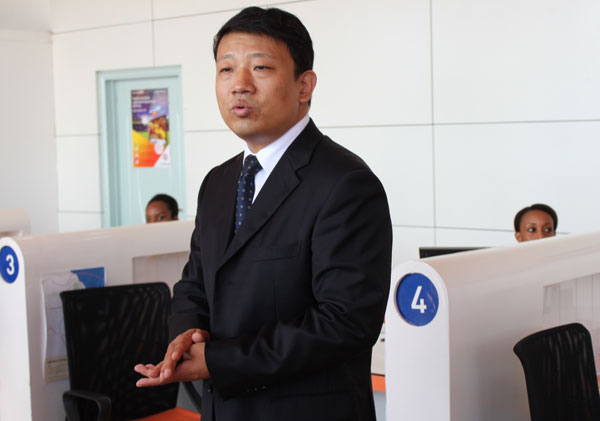Chinese company brings digital TV content to Africa
- By Pang Li
 0 Comment(s)
0 Comment(s) Print
Print E-mail China.org.cn, September 24, 2012
E-mail China.org.cn, September 24, 2012
|
|
|
William Lan, CEO of Star Media (Tanzania) Limited introduces his company to a press group in Dar es Salaam, Tanzania on September 21, 2012. [Pang Li/China.org.cn] |
"I am very proud of what I am doing," said William Lan, CEO of Star Media (Tanzania) Limited in Dar es Salaam, Tanzania on Friday. Lan has very good reasons to take pride in his company, a joint venture between Chinese TV network operator StarTimes and the Tanzania Broadcasting Corporation. In just three years his company has become a dominant player in Tanzania's digital TV content market.
Lan said that the company, which was founded three years ago and officially launched its services last September, is now providing digital TV content to more than 220,000 people in Tanzania, or 21 percent of the country's population.
Lan said that that his company's services cover seven regions and include 54 high-quality channels in multiple languages such as English, Chinese and Kiswahili. The channels, including China Central Television-9, BBC World and MTV Base, among others, cover news, music, film and TV shows, sports and children's shows. "It is a great boost to local people's cultural consumption," he said.
Chinese culture plays an important part in those programs. The newly introduced kung fu channel, which plays martial art TV series, movies and documentaries, among others, is one of the most popular channels, Lan said.
Star Media not only brings inexpensive TV content to local people, but also creates job opportunities for the local economy. Lan said that his company employs 260 employees right now, of whom 230 are Tanzanian.
Asked why he takes business to the country, the manager said first of all his company can provide the technologies that Tanzania needs right now as the country aims to replace analog TV with digital TV by 2015. Secondly, the Tanzanian government has preferential policies for Chinese companies including tax reduction. Thirdly, the project has received support from the Chinese government.
In addition, StarTimes is now operating in another eight African countries including Nigeria, Kenya and Uganda. It has acquired operating licenses in 13 African countries with 460 million potential customers.
As of January, the company has received 1.2 million subscribers in Africa. Its business revenue jumped from US$20 million in 2010 to US$50 million in 2011.






